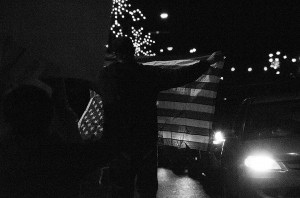
I’ve lived in the United States of America for ten years. This is what I have learned.
I came to this country as an undergraduate, just 18 years old. I am an Indian citizen who grew up in the Philippines, who went to an international school from K-12, who never had to think about race. And then 9/11 happened in 2001. I was a freshman in high school. I saw the coverage. I texted a friend to turn on the news when it happened.
My brother was in college then, and received instructions on who to contact if he was stopped by TSA or anyone else. I didn’t understand at that point that “brown” meant “threat.” I started my undergraduate degree in 2005, and I received similar instructions.
I still didn’t understand.
When I came here, on a student visa, unprepared to deal with actual seasons with my tropical upbringing, I came with hope. I came with certainty that this country could be my future. America, after all, is the dream. It is the polyglot, polycultural nation that seems an ideal — a nation bound by its apparent motto that all who come here are equal.
Then I learned that wasn’t true for everybody.
We are held up as ideals, while still being interrogated as not being “real Americans.”
I learned that when people asked me where I was from, and I was honest about being Indian and having grown up in the Philippines, that they would be satisfied about my other-ness. I learned that the surprised reaction of “But you don’t have an accent!” when I spoke about my background was validation in knowing that I was other because of my skin.
When I lied and said that I was from New York, I received the reaction of “But where are you really from?” I found myself in a scenario where I couldn’t win: I could either be who I was, and be an outsider — or pretend to be an American, and still be treated as an outsider, because of my brownness.
While Bobby Jindal has no chance of winning the Republican primary, his comments illustrate why South Asian Americans need to stand up and fight for the #BlackLivesMatter movement. We are held up as ideals, while still being interrogated as not being “real Americans.” We are part of the reason that White America gets to say “Hey we’re not racist, look at these guys!” In holding up that model minority myth, in perpetuating respectability politics, we are complicit in a system that is actively killing people who are supposedly lower on the totem pole. Our silence — especially in the wake of Sandra Bland’s death — grows deafeningly loud.
We think that if we behave, that if we do what they want, that if we are compliant that we will prevail. That is a myth. That is a fantasy. Our role in perpetuating the model minority myth means that we may unknowingly be perpetuating white supremacy itself. The insidiousness of white supremacy in the United States of America is the ability to convince you that you have a chance, an opportunity, a dream.
This is a lie.
Our silence — especially in the wake of Sandra Bland’s death — grows deafeningly loud.
If you’re a person of color, the system is always gamed against you, and if you somehow make it past the barriers, you are expected to perform in a way that upholds the status quo. That is how the concept of the institution works: People are homogenized based on a single ideology…and too many innocent lives are lost as a result.
Shyama Rajendran is a doctoral candidate in English at The George Washington University. Her work is on medieval English literature and multilingualism. You can follow her on Twitter @MedievalPhDemon. Read more of her work on Tumblr.












